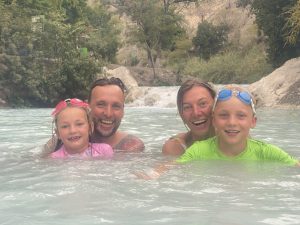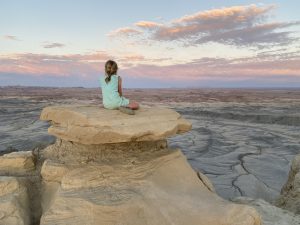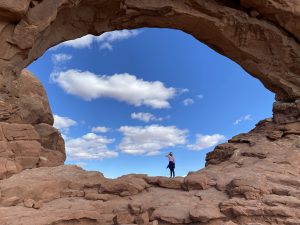In May 2023 we leave on a trip of 19 months in North and South America. You can follow our adventures here.
Special edition! How did we end up here?
Utah part 2
Beside this website we also have an Instagram page where we share pictures and stories of our travels. I have very mixed feelings about these social media. I don’t like at all how they force you to spend time on their platform in return for exposure of your pictures to the people who want to follow your travels. However, the platform has also been a great source of inspiration for us. And this has definitely been the case in Utah where there is so much to see that there are still amazing places to be found that are not yet in guide books or travel brochures. But they do pop up on Instagram pages of other travellers that are doing a similar trip. And if you ask politely most of them are very willing to let you in on the secret.
Utah: on the path of the eclipse
“It’s nice but it’s a lot of rocks”, dixit Caro after our first full day in Utah…and I had planned a full month in Utah with essentially ‘rocks’. Even though I knew that the variety of rocks, canyons, arches, bridges, hoodoos, etc. was almost endless in Utah, I must admit that I also had some doubts whether at some point we would not get a ‘rock bore out’. But I shouldn’t have worried because when we left the state over 4 weeks later it was with a bit of sadness and with a promise to come back one day (with a 4×4 vehicle).
Colors of Colorado
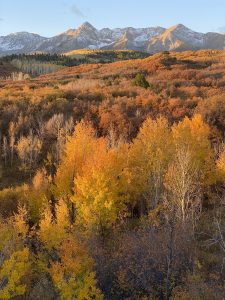 To be honest, we did not have Colorado on our radar at all. For us it was just the quickest way to get to Utah from South Dakota. The only place that we had planned to visit was the Rocky Mountain National Park. But we were in for a big surprise as somehow we managed to be there at the best time of the year…
To be honest, we did not have Colorado on our radar at all. For us it was just the quickest way to get to Utah from South Dakota. The only place that we had planned to visit was the Rocky Mountain National Park. But we were in for a big surprise as somehow we managed to be there at the best time of the year…
Side trip to South Dakota
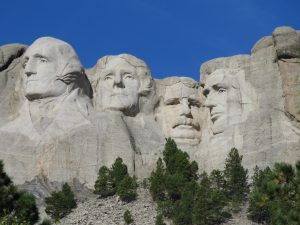 In our van, we have a map of the USA from Leon’s kids atlas. It has plenty of background on the country but also has some nice drawings of the major attractions. We use it to help the kids track our trip. But of course they also look at other places beyond the route we had in mind. And one evening they announced that they wanted to go to “the faces in the mountain”. Of course we had also looked at Mount Rushmore when we were reading up for this trip. But it was quite a detour (about 400 km) on the route we had in mind…AND we were a bit afraid that it would be one of these “that’s it?” tourist traps. But since the kids really wanted to see it (and we were a bit curious too), we decided to make the detour. And we soon discovered that there were quite some other interesting things in this area.
In our van, we have a map of the USA from Leon’s kids atlas. It has plenty of background on the country but also has some nice drawings of the major attractions. We use it to help the kids track our trip. But of course they also look at other places beyond the route we had in mind. And one evening they announced that they wanted to go to “the faces in the mountain”. Of course we had also looked at Mount Rushmore when we were reading up for this trip. But it was quite a detour (about 400 km) on the route we had in mind…AND we were a bit afraid that it would be one of these “that’s it?” tourist traps. But since the kids really wanted to see it (and we were a bit curious too), we decided to make the detour. And we soon discovered that there were quite some other interesting things in this area.
Back to Yellowstone and over the Beartooth pass
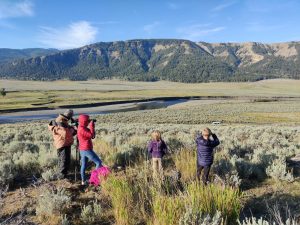 The ‘Lamar Valley wolfs’, subject of several documentaries and dozens of books are arguably the most famous residents of Yellowstone National Park. Wolves had been hunted to extinction in the 1920’s in the region but were reintroduced, in the midst of great controversy in 1995. Today there is a healthy population and the Lamar Valley is now one of the best places in the USA to see wolves in the wild. That is if you know what you are doing. There may now be about 100 wolves in Yellowstone but this park is gigantic so seeing a wolf is considered a ‘big bonus’. After our quest for the bull moose we now had a new mission ‘find a wolf’. But from our Grand Teton experience, we also learned that spotting specific animals is very hard and requires a lot of luck. However, it helps a lot if you can spot a good wildlife spotter. So the question was not so much “are we going to spot a wolf?” but rather “Will we find the right wolf spotter?”.
The ‘Lamar Valley wolfs’, subject of several documentaries and dozens of books are arguably the most famous residents of Yellowstone National Park. Wolves had been hunted to extinction in the 1920’s in the region but were reintroduced, in the midst of great controversy in 1995. Today there is a healthy population and the Lamar Valley is now one of the best places in the USA to see wolves in the wild. That is if you know what you are doing. There may now be about 100 wolves in Yellowstone but this park is gigantic so seeing a wolf is considered a ‘big bonus’. After our quest for the bull moose we now had a new mission ‘find a wolf’. But from our Grand Teton experience, we also learned that spotting specific animals is very hard and requires a lot of luck. However, it helps a lot if you can spot a good wildlife spotter. So the question was not so much “are we going to spot a wolf?” but rather “Will we find the right wolf spotter?”.
Grand Teton National Park
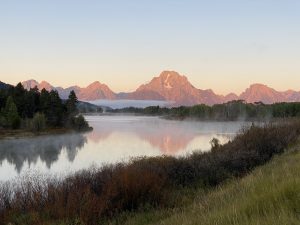 We thought that Grand Teton was going to be a quick side trip from Yellowstone but we stayed a bit longer than foreseen. To be honest we really did not know too well what to expect. In this region it’s usually the big brother,Yellowstone, that gets all the attention. But we did know one thing; this park was going to be our last realistic chance to see moose on this trip. And it was now end of September so the bulls would finally have their famous big antlers. Male moose lose their antlers every spring but they grow back by fall, just in time to be used in the mating season clashes with other bulls. The weeks before getting to Grand Teton we had been on the look out but without success. As we were about to leave ‘moose habitat’ it was ‘now or never’.
We thought that Grand Teton was going to be a quick side trip from Yellowstone but we stayed a bit longer than foreseen. To be honest we really did not know too well what to expect. In this region it’s usually the big brother,Yellowstone, that gets all the attention. But we did know one thing; this park was going to be our last realistic chance to see moose on this trip. And it was now end of September so the bulls would finally have their famous big antlers. Male moose lose their antlers every spring but they grow back by fall, just in time to be used in the mating season clashes with other bulls. The weeks before getting to Grand Teton we had been on the look out but without success. As we were about to leave ‘moose habitat’ it was ‘now or never’.
Yellowstone part 1
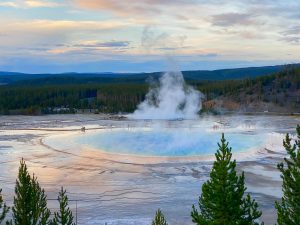 After seeing the BBC documentaries (there are several) on Yellowstone, this park had been very high on my list. But… I was not the only one who had the park on his list. Summer has always been busy here. But it seems that since Covid a lot of people in the US to the ‘great outdoors. So now some parks are really being overrun during the holidays. We were there in the second part of September and had hoped that things would have calmed down a bit. But from other travelers, that it was still “horribly busy”: no camp spots, traffic jams for hours, no parking, fighting for pictures… We were bracing ourselves for the ‘worst’ and started working on a plan. In the end it was even better than expected.
After seeing the BBC documentaries (there are several) on Yellowstone, this park had been very high on my list. But… I was not the only one who had the park on his list. Summer has always been busy here. But it seems that since Covid a lot of people in the US to the ‘great outdoors. So now some parks are really being overrun during the holidays. We were there in the second part of September and had hoped that things would have calmed down a bit. But from other travelers, that it was still “horribly busy”: no camp spots, traffic jams for hours, no parking, fighting for pictures… We were bracing ourselves for the ‘worst’ and started working on a plan. In the end it was even better than expected.
Washington to Montana
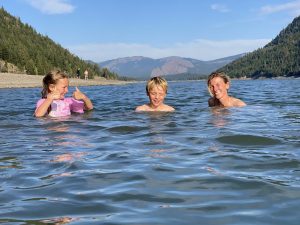 For our travels in the USA, there was an important decision we had to make, long before we set foot in the country: Do we apply for a visa that allows stays of up to 6 months or do we just use the 90 day ESTA? The former offers more flexibility but comes at a serious cost (150 euro per person) and a quite complex application process. The latter is cheap and very easy to get but puts quite a restriction on the planning. In the end we decided for the visa procedure and after filling out all kind of documents online, we found ourselves, queuing outside of the US embassy in the cold and rain, waiting for an interview which would determine if we were eligible for the visa or not. We got the visa! And we do not regret our choice at all. It gave us plenty of time to make our way down to Mexico. And after the ‘great Alaska rush’ summer we could really use this time time to slow down our travels.
For our travels in the USA, there was an important decision we had to make, long before we set foot in the country: Do we apply for a visa that allows stays of up to 6 months or do we just use the 90 day ESTA? The former offers more flexibility but comes at a serious cost (150 euro per person) and a quite complex application process. The latter is cheap and very easy to get but puts quite a restriction on the planning. In the end we decided for the visa procedure and after filling out all kind of documents online, we found ourselves, queuing outside of the US embassy in the cold and rain, waiting for an interview which would determine if we were eligible for the visa or not. We got the visa! And we do not regret our choice at all. It gave us plenty of time to make our way down to Mexico. And after the ‘great Alaska rush’ summer we could really use this time time to slow down our travels.
Goodbye Canada, hello USA!
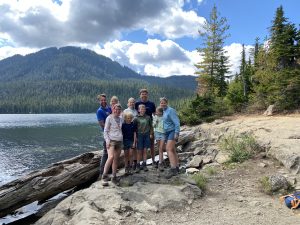 Vancouver Island was going to be our last stop in Canada and we look back at it with mixed feelings. It was really great to travel together with our friends from back home, but the Island was so very busy at the end of August. After all the peace and isolation up North this was quite a shock for us. We decided to flee across the border to the USA earlier than foreseen. It felt a bit bad to say goodbye to Canada in such a way…But the country was not going to let us go like that and still had a very nice surprise for us on our last day.
Vancouver Island was going to be our last stop in Canada and we look back at it with mixed feelings. It was really great to travel together with our friends from back home, but the Island was so very busy at the end of August. After all the peace and isolation up North this was quite a shock for us. We decided to flee across the border to the USA earlier than foreseen. It felt a bit bad to say goodbye to Canada in such a way…But the country was not going to let us go like that and still had a very nice surprise for us on our last day.

